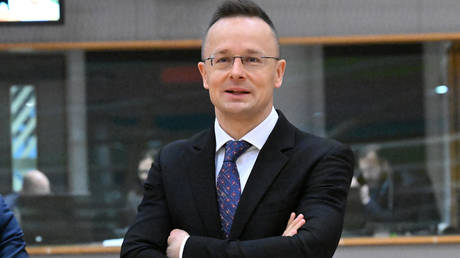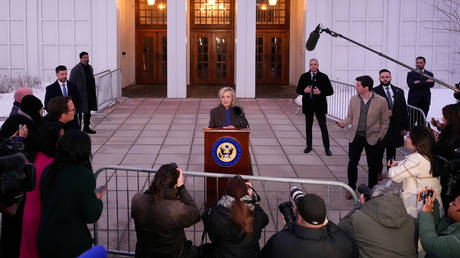
The bloc unanimously backed the idea of using frozen assets to help Ukraine
The EU’s planned seizure of billions of euros of interest payments arising from frozen Russian assets is reminiscent of communism, Hungarian Foreign Minister Peter Szijjarto told RIA Novosti on Thursday.
The EU is facing increasing pressure from the US and its allies to find ways to seize hundreds of billions of euros in frozen sovereign Russian funds.
Asked if Hungary would support the initiative to use profits generated from financial assets which belong to the Russian central bank and are now frozen by the EU, Szijjarto said the idea reminds him of how the communists used to confiscate assets from people in Hungary.
“These sorts of measures usually set off warning lights in our mind, that communist heritage is not what we’d like to see in our day and age,” he said, adding that Budapest has not heard any concrete plans on how this initiative would be implemented. “If one is available, we’ll definitely look over and discuss it,” he stated.
READ MORE: EU in ‘no rush’ to seize Russian assets – commissioner
Last week, it was revealed that the biggest holder of frozen Russian assets, Belgium-based clearinghouse Euroclear, had accrued almost €4.4 billion ($4.74 billion) last year in net interest earnings from funds in sanctioned Russian accounts. Euroclear is estimated to be holding €196.6 billion in Russian assets, mostly belonging to the country’s central bank.
In total, the US and its allies froze an estimated $300 billion in Russian assets at the beginning of the Russia-Ukraine conflict in February 2022.
EU ambassadors have agreed on the idea of using profits from sanctioned assets to support Ukraine, the Belgian Presidency of the EU Council announced following January’s summit in Brussels, although nothing has been officially implemented yet.
The US has been pushing for the confiscation of Russian funds, while $60 billion in aid to Ukraine has been stalled in Congress. The EU, however, has agreed on a €50 billion aid package for Kiev over the next four years, after Hungary withdrew its veto due to pressure from Brussels.
While Russia’s central bank had been in the process of weaning itself off the dollar and euro and switching to the Chinese yuan and gold since US sanctions in 2018, significant holdings in dollars, euros, British pounds, Japanese yen, and others were frozen in 2022.
The head of the Russian central bank, Elvira Nabiullina, has said that the seizure of profits from frozen Russian funds, as well as the seizure of the funds themselves, would lower the attractiveness of the euroand the dollar as a reserve currency in the international arena.




